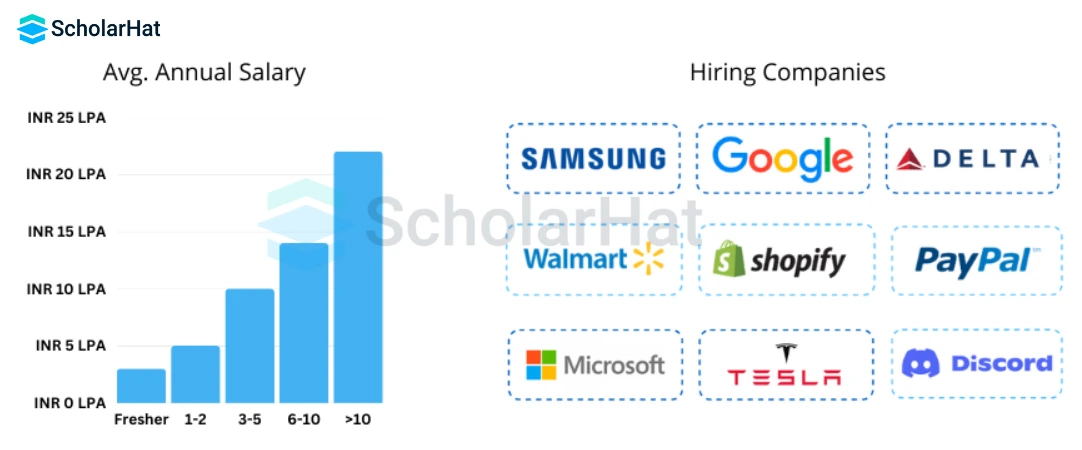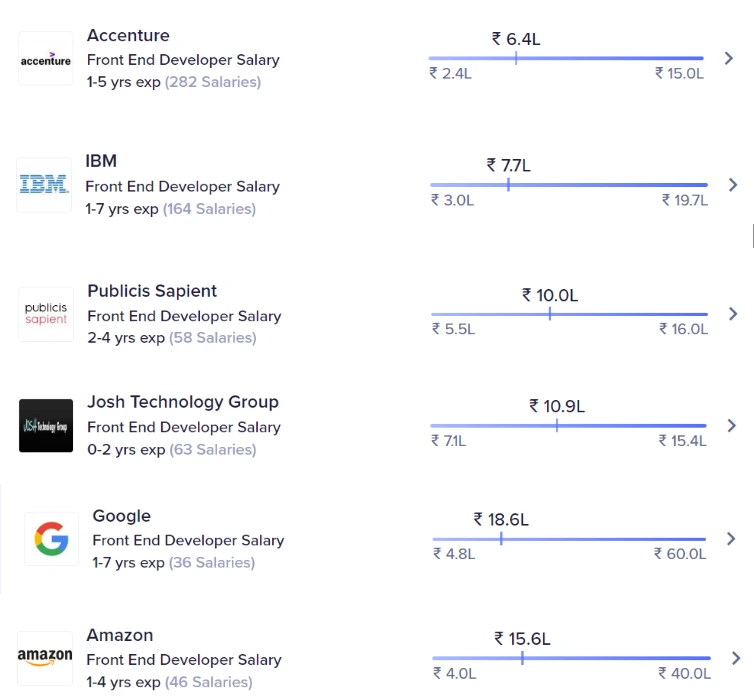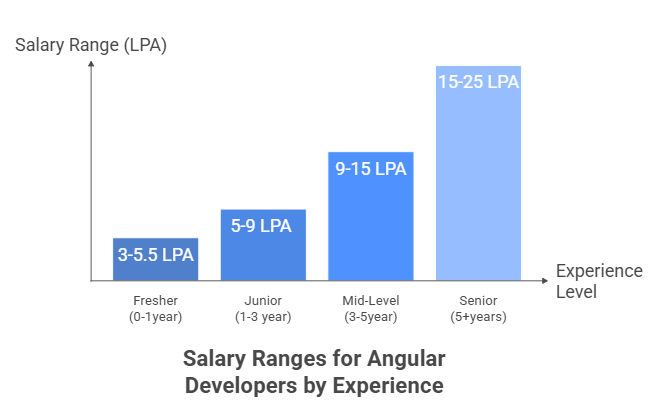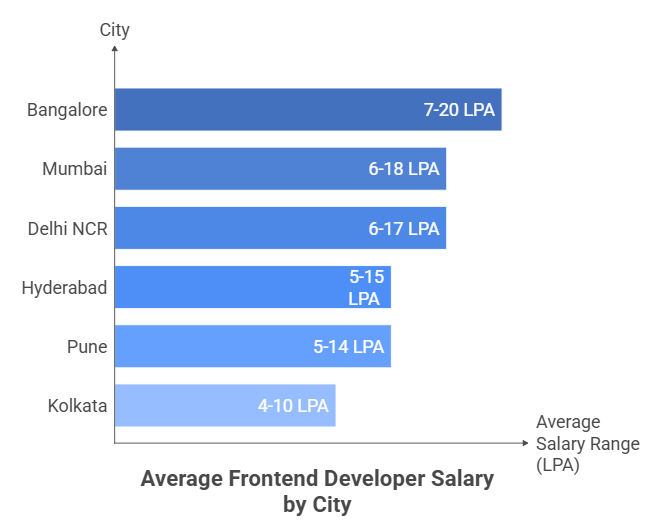06
FebFront End Developer Salary in India: For Freshers & Experienced
Frontend Developer in India earns between ₹3 LPA to ₹30+ LPA. The salary of a Frontend Developer can vary widely based on factors like experience, location, company, and skills. Highly skilled developers with a strong knowledge of frameworks such as React, Angular, or Vue.js can earn ₹15 lakhs or more. It’s a creative career with strong job opportunities and steady income growth.
In this article, you will able to know about frontend developer salary based on different factors.
| Experience Level | Annual Salary (INR |
| Fresher(0-1year) | ₹3 – ₹5.5 LPA |
| Junior(1-3year) | ₹5 – ₹9 LPA |
| Mid-level(3-5year) | ₹9 – ₹15 LPA |
| Senior(5+ year) | ₹15 – ₹30+ LPA |
What Does a Frontend Developer Do?
Frontend developers are the ones who design and build what users see on websites and apps, the buttons, layouts, colors, and everything that makes a site look and feel great. As more companies move online, the demand for skilled front-end developers is rising rapidly.
- Building responsive user interfaces using HTML, CSS, and JavaScript
- Working with frameworks like React, Angular, or Vue
- Integrating APIs and optimizing performance
- Collaborating with designers and backend developers
Average Salary of a Frontend Developer
The average salary of a Frontend Developer in 2025 is approximately:
- India: ₹7–10 LPA
- USA: $100,000 per year
Frontend Developer Salary in the USA
The salary for frontend developers in the USA is among the highest globally, reflecting the country's strong demand for skilled tech professionals and its focus on user-centric digital products. Salaries can vary based on experience level, geographic location, company type, and technical skills.
| Experience Level | Annual Salary (USD) |
| Entry-Level | $70,000 – $95,000 |
| Mid-Level | $95,000 – $125,000 |
| Senior Developer | $125,000 – $160,000 |
Frontend Developer Salary in India
The pay for front-end developers varies in India depending on a number of variables, including expertise, geography, and company size. The typical annual compensation for entry-level front-end developers is in the range of Rs. 3-5 lakhs.
However, as they become more skilled and knowledgeable in their speciality, their earnings may rise considerably. Mid-level developers can expect to make between Rs. 6 and Rs. 10 lakhs annually, while senior front-end developers could make between Rs. 12 and Rs. 20 lakhs annually or more.

The average base salary of a Frontend Developer in India is approximately ₹7,60,000 per year.
Read More - Top 50 Frontend Interview Questions and Answers
As per ambitionbox.com, Front end Developer salary in India ranges between ₹ 1.2 Lakhs to ₹ 11.4 Lakhs with an average annual salary of ₹ 4.0 Lakhs. Salary estimates are based on 31.2k latest salaries received from front-end Developers.

Image Source: www.ambitionbox.com on 18th Aug 2023
Read More - Web Developer Salary in India
Frontend Developer Salary Based on Experience

Frontend Developer Salary Based on Location
Metropolitan cities and tech hubs offer higher salaries due to greater demand and higher living costs.

Frontend Developer Salary Based on Employer
The salary of a frontend developer in India varies significantly depending on the type and size of the employer.
1. Product-Based Companies
Product-based companies focus on developing scalable digital products like apps, SaaS platforms, or enterprise software. These companies highly value clean UI/UX and interactive frontend design, making frontend developers a crucial asset.
| Top Employers | Salary Range(INR) |
| Google, Microsoft, Adobe | ₹18 – ₹30+ LPA |
| Amazon, Flipkart, Paytm | ₹15 – ₹28 LPA |
| Zoho, Freshworks, Razorpay | ₹12 – ₹20 LPA |
2. Service-Based Companies
Service-based companies work on client projects, often in limited sprints. While the pay is lower, these companies may provide broader exposure to different tech stacks and industries.
| Top Employers | Salary Range (INR) |
| TCS, Infosys, Wipro | ₹3 – ₹8 LPA |
| Cognizant, HCL, Capgemini | ₹4 – ₹9 LPA |
3. Startups
Startups often provide high-impact work and fast-paced environments. Depending on funding and size, salaries vary widely. Salary Range (INR): ₹3 – ₹6 LPA
Frontend Developer Salary Based on Qualifications
The salary of a frontend developer in India can vary significantly depending on academic qualifications, certifications, and specialized training.
1. Bachelor’s Degree
A bachelor’s degree in Computer Science, Information Technology, or a related field is often the minimum educational qualification for frontend developer roles.
- Typical Degrees: B.Tech, B.E., BCA, B.Sc (CS/IT)
- Salary Range: ₹3,00,000 – ₹10,00,000 per annum
- Employers: Service-based companies, startups, MNCs
2. Master’s Degree
Candidates with a master’s degree in Computer Science, IT, or MCA often receive higher starting salaries and better growth prospects, especially in MNCs or R&D-focused teams.
- Typical Degrees: M.Tech, MCA, M.Sc (CS/IT)
- Salary Range: ₹5,00,000 – ₹15,00,000+ per annum
- Employers: Product companies, large MNCs, research roles
Certifications
Certifications validate practical frontend development skills and tools. They are particularly valuable for self-taught developers or those transitioning from other fields.
- Salary Boost: 10%–30% over uncertified peers
- Typical Salary Range with Certification: ₹5,00,000 – ₹14,00,000 per annum
How to Prepare for Frontend Interviews?
It takes a combination of technical knowledge, problem-solving abilities, and good communication to prepare for front-end developer interviews. A guide for preparing for front-end interviews is provided below:
- Know the Basics: Review HTML, CSS, and JavaScript's foundational concepts. Make sure you understand these foundational technologies very well.
- Master Frameworks and Libraries: Focus on understanding well-known front-end libraries and frameworks like React, Angular, or Vue.js depending on the demands of the job. With them, practice building projects.
- Practice Coding Challenges: A variety of coding challenges are available on websites like LeetCode, HackerRank, and CodeSignal. Work through these difficulties to hone your coding and problem-solving talents.
- Develop Projects: Make a portfolio of works that demonstrate your proficiency in front-end development. Include a range of projects that show off your prowess in working with various technologies and resolving issues in the real world.
- Responsive Design: Know the principles of responsive web design. Be prepared to talk about how you create web applications that are responsive for different screen widths.
- Version control (Git): Get acquainted with GitHub and Git. Be prepared to talk about the role version control plays in your development process.
- Debugging Skills: Use debugging code efficiently. Prepare to give an example of how you analyze and resolve typical front-end problems.
- Examine the business: Do some research on the business before the interview. Recognize their offerings, values, and culture. Have your justification for wanting to work there ready.
- Ask queries: Prepare meaningful interview questions in advance. This displays your interest in the organization and the position.
- Mock Interviews: To acquire feedback and build confidence, think about doing mock interviews with seasoned developers or hiring coaches.
What are the Skills Required to be a Frontend Development?
A broad range of abilities is needed in the fascinating and constantly changing field of front-end development. There are a few essential front-end programming languages that any prospective developer has to be familiar with.
Languages:
- HTML (Hypertext Markup Language): The content of a web page can be organized using HTML (Hypertext Markup Language).
- CSS (Cascading Style Sheets): Cascading Style Sheets, or CSS, are used to style the look of online pages.
- JavaScript: JavaScript is a powerful scripting language that may be used on websites to add animations, interaction, and dynamic information.
Frameworks and Libraries:
- Bootstrap: A well-known front-end framework called Bootstrap offers pre-made HTML, CSS, and JavaScript components for quick site creation.
- jQuery: jQuery is a quick, compact, and feature-rich JavaScript toolkit that makes it simple to navigate through and manipulate HTML documents.
- React: A JavaScript library created by Facebook for creating user interfaces.
- Angular: Google created the TypeScript-based Angular framework to create dynamic web applications.
- Vue.js: A straightforward and adaptable progressive JavaScript framework for creating user interfaces.
Since they are essential for building dynamic, data-driven online applications, RESTful services, and APIs are also used by front-end developers. APIs enable real-time updates and improved user experiences by enabling front-end developers to communicate with external services, databases, and resources to fetch and change data. Representational State Transfer, or RESTful services, is a popular architectural paradigm for creating APIs that places an emphasis on uniformity, scalability, and simplicity.
In general, front-end development presents a wide range of alternatives for those looking to build websites that are both aesthetically pleasing and user-friendly. You may successfully complete any front-end development project by mastering HTML, CSS, JavaScript, and other relevant technologies. So don't wait; go right into front-end development and start creating incredible websites!
Factors influencing Front-End Developer Salaries in India?
The need for skills, experience, geography, firm size, and other relevant elements can all have an impact on front-end developer salaries in India. The following are some of the key factors that influence front-end developer salaries in India:
Skillset and Expertise:
- Higher wages might be demanded from front-end developers who are proficient in the newest frameworks, tools, and technologies like React, Angular, Vue.js, and responsive design.
- Salary levels may also be impacted by experience with contemporary development techniques like component-based design, state management, and performance optimization.
Experience Level:
- Due to the depth of their knowledge and the complexity of tasks they can handle, junior developers often earn less than mid-level and senior developers.
Location:
- Based on the city or location, salaries can vary greatly. Due to higher living expenses and more demand for tech expertise, metropolitan areas like Bangalore, Mumbai, and Delhi typically offer higher pay.
Company Type and Size:
- Startups, small-to-medium businesses (SMEs), and larger organizations may have different pay scales. Larger businesses frequently provide more attractive remuneration packages.
Responsibilities and Role:
- Higher salaries may be expected for specialized positions such as UI/UX designers, front-end leads, or specialists in particular technologies.
Education and Certifications:
- Salary ranges may be influenced by relevant degrees or certifications in front-end development.
Market Trends:
- Industry developments and prevailing economic conditions might have an impact on salaries.
It's vital to remember that depending on how these elements interact, earnings might vary significantly. It's critical for both job seekers and companies to take these aspects into account when establishing or providing front-end developer compensation as the technology landscape changes and the need for competent front-end developers rises.
Conclusion
You have several options to stand out on the job market as a talented Front-End developer. You can position yourself as a top contender for Front-End developer opportunities by picking a front-end developer Course, developing your skills, keeping up with industry changes, and skillfully demonstrating your abilities.
What are you still holding out for? There are endless possibilities out there! Take a chance to look into Scholarhat certification course for React frontend development












